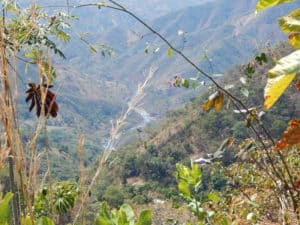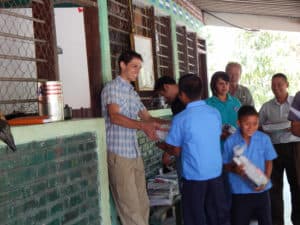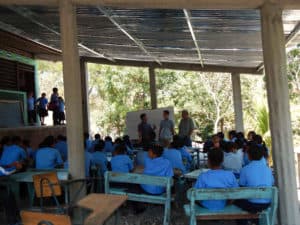Jens sits at our dining room table, our only table, in La Esperanza, as Laura and I explain to him the particular water challenges we face here in Intibucá. Jens, a 17 year old, US born citizen of German heritage, living in Tegucigalpa, Honduras, is visiting with us over the next few days. His older brother Jan, Jan’s friend Aeden, and Mario, a friend of both families and the driver/chaperon for the trip, are all visiting us in our small and modest home. Aeden is home from college in Prague where he studies cinematography. Jan is interested in the same career, but studies at Emory University in Georgia. Shoulder to Shoulder has contracted with Aeden to produce three videos: two will be short ones on brigades and Shoulder to Shoulder in general, and the third will be a documentary on the bilingual school. Presently, we’re trying to arrange a fold out coach and three mattresses on our limited floor space so everyone can sleep. Jens continues to incredulously question us on the water, unwilling to conceive that water runs only every other day. “But, what do you do about that ‘take a shower every day’ rule?” We then introduce Jens to the concept of a bucket shower, a concept he’ll become familiar with over the next three days.
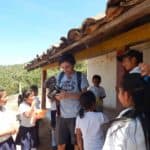
The rural, isolated, poor, frontier region of Intibucá is very unfamiliar to our four guests from Tegucigalpa. You might say that it presents as more foreign to them than it would have even to us when we first arrived. But they have all come with a spirit of openness, acceptance, and generosity. They capture on video the commitment to service in Pinares where Virginia Commonwealth University and Fairfax Family Practice Centers are holding their two week medical brigade. After a morning and afternoon of videotaping there, we drive south toward Concepcion where our guests will stay with us in our home there. It is clear that Mario doesn’t believe me when I tell him that three minutes after leaving Pinares we’ll run out of pavement. When we begin bumping up and down, navigating the trenches where rain has eroded the road, he asks how far to Concepcion. “Maybe ten miles, but it will take us about an hour.” Mario works with the Central American Bank. The Central American Bank subsidized the paving of this road. According to their records, it’s been paved all the way to Camasca. He will register an official complaint report. But our going is slow, not only because of the road, but also because every five minutes or so, Aeden and Jan yell to stop the car. They grab their equipment and jump out of the car. They take beautiful shots of the expansive terrain, the majestic mountains, and the awe it inspires. I take this road too often. I no longer recognize the breathtaking views or the bumpy drive.
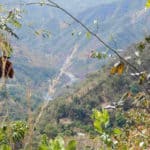
In Concepcion we all settle into our home. There is a lot more space and rooms, but we’re short a mattress. Mario disappears for a short time, and, unbeknownst to us, borrows a mattress from our neighbors. We tell the boys there is always water at night, but we often lose it for a few hours in the morning. They take no heed to our warning. In the morning, as they take their bucket showers, Laura and I are holding back our laughter as we watch them throwing cold water from our pila onto their bodies. So energetic and enthusiastic, so bright and ready to take on the world. With the medium of video, they will make art, their free expression to inspire.
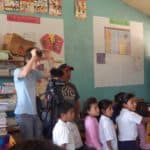
We head to Camasca and the bilingual school. Here, they are recording a view of hope. The parents send their children to our school with a great hope of something new, of achievement, of a better day. I can’t help think about those expansive, limitless views of the mountains from yesterday. Ironic, here where boundless beauty is so easily witnessed in nature, the constraints of poverty are so clear. Poverty limits experience, limits the horizon. Aeden films Juan Carlos and Keilyn, two cousins who live two-hundred meters below the town proper. They don’t have much, but they do have a climb up a great hill every morning. It’s a rugged climb and I feel some shame for my self pity that the road I travel is not paved. The path Juan Carlos and Keilyn take is one with carved footholds into a slate, rock face. They climb, we climb, we film, we record, and this is hope. It springs upon us when we reach the summit, an opening appears. Then we’re at the school.
Some of us have been given much, some of us, little. But all of us have rutted roads to travel, and all of us can gaze upon the expansive beauty of our world. Can not all of us then pattern hope? We can remember and record. We can share. It is not so important from where we start our journeys, but the integrity of the journey is the clear testament of hope.
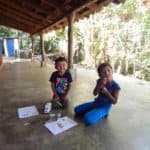
A Child's Valuable Lesson
His name is Valentino (yes just like the bygone, heart throb, movie idol). These days, he’s hanging out with the second graders at the Good Shepherd Bilingual School. He’s only six and the other children in the second grade classroom are seven or eight. But he’s tall for his age, his English is excellent, and so in many ways he fits right in. He’s energetic, very outgoing, and makes friends easily, both among his peers and adults. He’s at ease in this environment, even though it is not the one in which he was born and raised. He’s from Ohio and he’s only been in Honduras for three to four months. He gives pause to any adult looking on because he sticks out like a sore thumb. His fair hair and eyes, his Mohawk haircut, his height, and other subtle characteristics give him away as not from here. But he doesn’t know and doesn’t care. He likes it here. The other children flock around him. Perhaps we might want to think he has a magnetic personality. He does, I think, but the reason he attracts playmates and friends has little to do with his personality. He’s different, and as much as he wants to learn about them, they want to learn about him. Every day is a new adventure of discovery and fun.
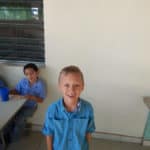
Children simply don’t have the inhibitions that adults suffer. Even though we think it natural to stiffen when confronted with the unfamiliar, it’s really simply learned behavior. A new language, a new environment and culture, new ways of thinking, feeling, and relating, are not really burdens or obstacles to be overcome, but rather opportunities for enrichment. Children know this innately, and we adults can learn a great deal in watching them. We’d probably have a lot fewer wars, and build a lot fewer walls, physically as well as in our minds and hearts, if only we would heed the lesson Valentino has to teach us. Fear is a learned response. It has its place. It can protect us. But it is not our natural response. Our natural response, our instinct if you will, is to connect. Something it seems that Valentino and his playmates at the Good Shepherd Bilingual School achieve with ease and grace.
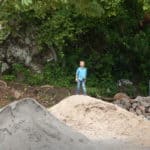
Valentino’s background, his family influence, also has something to do with his disinhibition to be sure. His mother, Jessica Lynn Lemus-Donahue, has been volunteering at our bilingual school since March. She met her husband, Edman, originally from Camasca, Intibucá many years ago in Ohio and were married in 2011. They brought Valentino into the world, followed by Penelope, now age 2.” Jessica had been working, and continues to work part-time via the internet, as a paralegal dealing with immigration law. That is where she learned her flawless Spanish. She told us that she had never been to a Latin American country except for one visit in which she brought the two-year old Valentino to visit her mother-in-law in Honduras. It’s a little difficult for me to believe this as she seems to fit in so seamlessly here. Just like her son, the children at the bilingual school flock around her. They usually try to speak Spanish with her, but she gently responds in English, and solicits them kindly to converse in English. She’s been a great asset to the school, mostly with our kindergarten class where she spends most of her time. She has that rare gift found among teachers of excellent quality. Her approving smile is always present, never judging or critical, but always calling forth the best from her students. She initiated a behavioral, color-coded chart for each student. On the day we visited the kindergarten class, each child presented her with their chart. She told them their color for the day. Most got green, meaning their behavior was excellent. With pride they colored in their day, readied to take them home, show their parents, get their signature, and bring them back on the next school day.
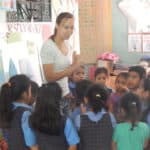
We were so impressed with the children’s acceptance of Jessica, and Jessica’s acceptance of them. For Valentino, it seems the apple has not fallen so far from the tree. After class, we enjoyed a brief lunch with Jessica. The family’s trip to Honduras, and their stay with relatives in Camasca, is in order for Edman to obtain his legal immigration status in the US. In as much as they are married, there is little doubt that Edman will obtain legal status. Still, Honduras loves bureaucratic procedures and it is unclear as to when all the mountains of paperwork will be processed. Perhaps with luck, all will be complete in the Fall. For Shoulder to Shoulder and the school, we wish the couple every success, but we are equally happy that Jessica is able to volunteer through the end of the school year in November.
In planning their trip, Jessica knew she wanted to do something meaningful here in Honduras. She searched the internet and found Shoulder to Shoulder. Not surprising really, as we are one of only a very few charitable organizations here in the Frontera. Besides her work at the school, Jessica has started a Pilates exercise and workout class for the local women in Camasca. It gives the woman a moment of healthy time away from the demands of the household. She seems pleased to be doing something of meaning and purpose while she’s here. The kids seem to love her, and she is certainly dedicated to the children and their families. More than anything, we are grateful for her generosity and commitment.
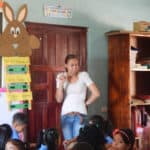
We are always looking for native English-speaking volunteers at Good Shepherd School. On the face of it, it is simply a great asset to have native English speakers in the classroom with the kids. To hear English spoken well and to converse goes such a long way towards helping our children achieve a bilingual competence. This will be of great asset to them, providing them with opportunities they would otherwise not have had. Still, Valentino and his mom show us that the value of their presence among us is so much more than simple linguistic competence. It’s really about making connections. Connections yield understanding. Understanding brings about just relationships. Just relationships secure peace. The children at Good Shepherd Bilingual School, Shoulder to Shoulder, and the people of Camasca are enriched for the presence of Jessica, Edman, Valentino, and Penelope. Thank you for making your home among us.
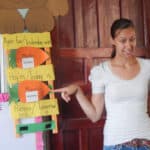
Getting There
March 9, 2015
It’s hard to imagine which is more mysterious and challenging, the terrain or the persons who inhabit it.
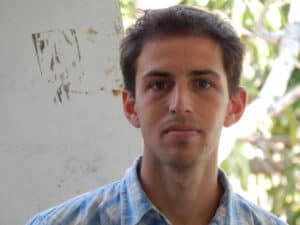
Joshua Back, a fourth year medical student at University of Rochester, has taken nine months off from purely academic pursuits to live and volunteer among the people of San José, San Marcos, Intibucá, Honduras. The university, collaborating with Shoulder to Shoulder for almost a decade of brigade work in San José and the surrounding communities, has invested in relationships of empowerment and development. Josh is deepening and broadening those relationships and discerning the best future practices for the university in its global health outreach in this small corner of Honduras. He met us a few weeks ago at the small bus stop called El Rancho, about a half hour walk from his house, to give us an interview and a tour.
From the highway, everything slopes down at a 45 to 70 degree grade to the river, perhaps two miles. Across the river is a mirror image, climbing at the same steep degree to the most isolated communities in the area. Twenty minutes after meeting us, we’re at Josh’s house, the brigade quarters across the street from the university’s clinic. The walk was an easy one, all downhill. The dirt road is well maintained by Honduras standards, possibly because no one here owns a car to drive on it. An occasional delivery vehicle dares the steep grade. Later in the day we’ll see newly placed telephone poles. The Honduran government drove them here and dropped them on the shoulder of the road. The locals carried them to where they needed to go, dug out the holes, and secured them in the ground. All without any equipment! At his house, Josh informs us we will be walking down the mountain to the community of Portillon. With the aid of the Central American bank, the local school has added seventh and eighth grade, and next year, ninth. There, Josh and the teachers will present the seventh and eighth grade students with donated supplies from the First Unitarian Church in Rochester. Josh asks us how much water we have. When we tell him we have a bottle to share between us, Josh packs three additional bottles and we head out his door. What have we gotten ourselves into?
Half the time we walk along the road, and the other half along mountain paths. The road is longer, zigzagging sharply to lessen the severity of the slope. The paths drop precipitously, the footing is precarious, but the views are awesome. It’s easy going down, save for the tightening of calf muscles, but there is the nagging realization that for every step down there will be a corresponding step up. We meet persons along the road and path, walking or in their homes. Josh stops to speak with them all and to introduce us. His Spanish is a little halting, but he clearly makes himself understood. The Spanish of those living here, however, is heavily accented and harshly abbreviated. With very little formal education and even less contact with the larger world, the locals cannot understand that what they are speaking only roughly approximates Spanish. But Josh’s ear and his whole person has become attuned to the people. He listens intently. Sometimes he still doesn’t understand, and he asks them to repeat. This might take three or four times. Admitting that you don’t understand, highlighting yourself as an outsider, is to place yourself in a very vulnerable position. It’s uncomfortable, unsettling, and creates a sense of insecurity. It’s usually simply easier to pretend that you understand. But the patience and integrity that Josh demonstrates is what draws him into a relationship of trust with the people. It is clear as we walk with him that Josh is well known and well respected among these people.
Josh is a medical student, soon to be a doctor. The empiricist in him must certainly understand the axiom “the shortest distance between two points is a straight line.” But there aren’t many straight lines here. A straight line down or up the mountain would most certainly result in either a mortal accident or a coronary. A straight line to the people would create fear and mistrust. It is often the circuitous route that yields a quality result. That is not an empirical principle, but more properly the understanding of a social scientist. Josh did not present so much as a doctor, but rather a social worker.
Then we arrived at the school in El Portillon. The people here are poor, but the little they have, they have achieved by taking long and arduous journeys. They now have a seventh and eighth grade. Prior to now, if a family wanted a child to be educated beyond the sixth grade, they would have to send the child to either Concepción or San Marcos. Because of the long travel, because of the crooked lines, the child could not commute in the same day and would have to board. That expense prohibited further education for almost everyone. The community found a way. The community has always lacked running water. But as we are visiting, the construction of the holding tank is being completed. The water will be piped from two kilometers away, a spring the community managed to purchase. The community found a way. Josh seems to recognize the tenacity and industriousness of the people as he participates in the ceremony, distributing school supplies. They are just a few small items, a few notebooks, pens, pencils, markers, erasers, and a small calculator. But the gesture demands a grand celebration, another leg of the journey complete.
Then we need to head back. The directions we travel are so varied and complex. To go down means to go up. To go right means to go left. And to look out over the great expanse of mountains and sky, to be overwhelmed by the awesome beauty of nature, means to stand at the edge of a cliff. We arrive at Josh’s house. Josh, much younger and in better shape, is accustomed to the climbs, while we are exhausted. We rest a while before we’ll return to the highway. Josh offers to accompany us, but just as we are preparing to leave, a man stops into visit. He’s difficult to understand and Josh is asking him to repeat. There seems to be something on his mind, something he needs to discuss, but the conversation is anything but direct. Patience, Josh, this looks like it will be another long journey along very winding routes. We take our leave, certain that the University of Rochester will get an excellent report on their mission in Honduras from their social worker, I mean, medical student, Josh Back.
It’s hard to imagine which is more mysterious and challenging, the terrain or the persons who inhabit it.


